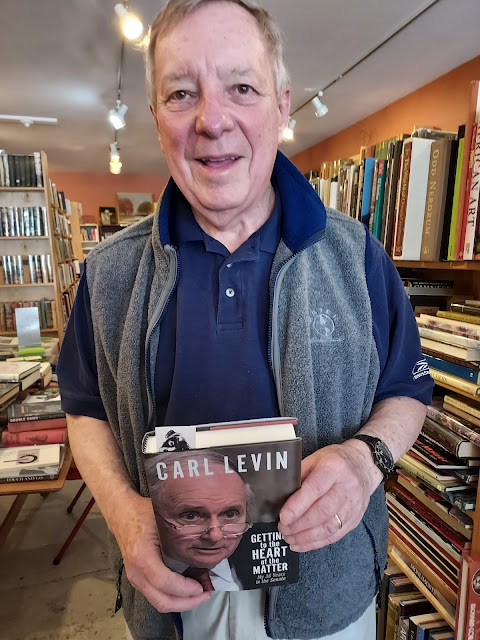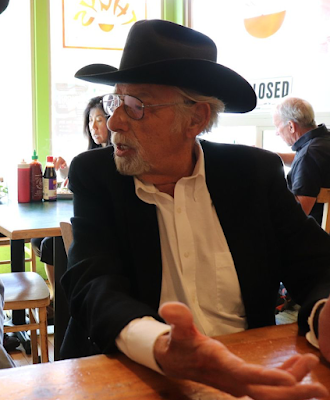 |
| "Isn't it all about me?" Not always, girl! |
New England is a long way from Michigan, and I’ve never been closer to the former than New Jersey (which doesn’t count at all, I’m sure). Neither has New England been part of my dream life, a place I’ve longed to see. My parents made the trip once to see the famed New England autumn and were appalled by the traffic and the difficulty of finding overnight accommodations, not having booked ahead. My father’s conclusion was: “Michigan is better.” And October 2024 in Michigan was certainly one of the loveliest ever. But this is all beside my point, which is that A Memory of Vermont as a book title would not necessarily draw me in, except for the subtitle, Our Life in the Johnny Appleseed Bookshop. Now that’s more like it!
 |
| My outdoor winter world, as of a day ago -- |
Poet Walter Hard’s drugstore, following a tradition begun by his own father, featured a table of books, so when Walter and Margaret’s daughter wanted experience in the book world before graduating from college, her idea was to have her own summer bookshop in their little town of Manchester, Vermont. As a bookseller and reader, I am always interested to learn how someone else got into the business. What happened with Ruth’s seasonal shop was that after she graduated and went on to a career in publishing, her parents continued the Johnny Appleseed Bookshop. Her father even sold the family drugstore to have more time to devote to his own writing (a decision that shocked many in the town), and he and his wife, besides their other writings in poetry and prose, collaborated on a travel book called This Is Vermont.
 |
| Well, there she is again! |
As I read their story, which inevitably includes many other writers and mention of many books, what strikes me over and over is all the connections books make in a reading life – connections to other writers and other books. Walter Hard, for example, was asked to write The Connecticut for the “Rivers of America” series, and only just the other day I finished Hodding Carter’s The Lower Mississippi from the same series, having been led to Hodding Carter by Albert Murray, after having been led to Albert Murray by some other author’s book, though now I forget which book or author. And imagine my delight to learn that Ruth Hard, in stocking her original Johnny Appleseed Bookshop, carried all of Mary Webb’s books then in print, having fallen in love as I did with Precious Bane after reading about that book in yet another book, so that when I read of Ruth's love for Precious Bane, I feel I am meeting a friend with whom I share something important.
 |
| In their winter caps.... |
And then Hendrik Willem Van Loon himself pays a visit to the Johnny Appleseed Bookshop and inscribes his book on Rembrandt to Margaret (after she procures 10 copies of the remaindered volume for him and one for herself) with a wonderfully detailed drawing of Rembrandt in his studio! Van Loon! The first of his books I had a chance to obtain was his Geography, found at a yard sale in Leland one summer long ago, so long ago that the author’s name was then still unfamiliar to me, but the art on the pages captured my eye, and I was very happy years later to have in my own shop, for a while, a first edition of his The Story of Mankind, the very first Newbery winner (1922), written for children and so popular with grownups that a paperback edition had to be issued issued for adults.
 |
| The trees in their winter white.... |
My favorite Van Loon, though, has to be Lives. In Van Loon's Lives, the narrator and a relative decide to give a series of dinner parties with the most interesting guests they can think to invite. Following a brilliant decision that invitations do not have to be limited to the living, the first guest they invite is Erasmus. For each social evening planned, there is discussion of the menu and what aspects of “modern” life might most interest their guest or guests from the past. What intrigues the guests is not always what the hosts expected! But again the charm of the illustrations -- ! For instance, Descartes with his cape blowing in the wind! I have always wondered if this book might not have been the inspiration for the old television show, Steve Allen’s “Meeting of Minds.”
Reading books and finding in them mention of other familiar books and authors, as well as encountering titles and names one is inspired to seek out, is only one aspect of the meeting of minds that takes place in reading, but I find it endlessly enchanting.
In the more than three decades of my own bookshop, I too have met many interesting and delightful people from all walks of life, not only writers and other booksellers but people with backgrounds and callings very different from my own. Sometimes in the morning before we began our days in Northport, the Artist would muse, “I wonder who we’ll meet today.” For me, there has always been the additional question, What books will find their way to me today? Other minds, many connections, old friends and new.
 |
| Homeward bound |
As you can see from the images in today’s post, winter has arrived at last Up North. I drove to Traverse City on Tuesday morning through the most beautiful scenes imaginable: sun-kissed, snow-laden branches glistening bright, blinding white against ominously dark masses of clouds. I’d been in my bookshop on Sunday and Monday, both supposedly days off according to my winter schedule, but there were still a lot of holiday visitors in town on Sunday, and I had deliveries to meet on Monday. Tuesday, then, was my first chance to get to Traverse City to pick up the new order of book bags, and Sunny and I made it to the dog park in Northport by noon, where we saw several of our mutual friends. Nice!
I thought I might be snowed in on Wednesday, but my plow guy had come, and the winter storm warning was from 7 p.m. on Wednesday to 7 p.m. on Thursday, so I went to Northport, picked up mail, bought some groceries, and opened my shop for four hours. One in-store customer and one phone order made my being there worthwhile. Now, will Thursday will be a snowed-in-at-home day?
 |
| Back way into the village on Wednesday |
 |
| Coming down the hill |
 |
| Our beautiful village tree! |









